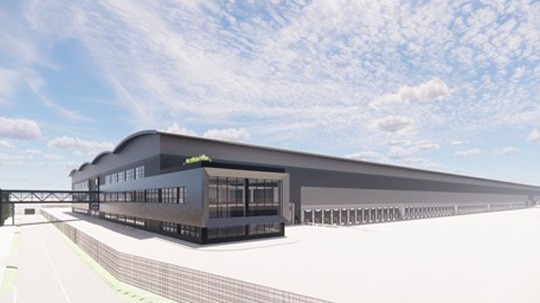Net zero
We are committed to achieving net zero emissions by 2040. This ambition is aligned to the latest climate science, and a 1.5°C decarbonisation pathway to reduce our greenhouse gases (GHG), in support of the Paris Agreement and UN Framework Convention on Climate Change.
Our ambition
To become a net zero carbon business by 2040 across all emission scopes
Our commitments
We will:
- Reduce the emissions associated with our business operations;
- Work with our suppliers and other partners to encourage the reduction of emissions across our value chain;
- Address the physical and transitional risks and opportunities associated with climate change through appropriate mitigation and adaptation.
Royal Mail’s 85,000 posties walk up to a billion steps a day, and deliver to around 32 million addresses. These ‘feet on the street’ help make the company the greenest option for delivering parcels, based on publicly reported emissions**.
Yet our Steps to Zero plan goes even further to recognise the urgency of addressing climate change. It is based on four distinct pillars with ambitious targets:
- Net Zero deliveries: deploying low and zero emission vehicles for final mile deliveries, reaching 5,000 electric vans in 2023
- Net Zero operations: Re-designing an efficient parcels focused network that utilises low-carbon transport modes and drives energy efficiency in our buildings.
- Making circular happen: Transforming our operations to embrace circularity by reducing our operational waste and designing more sustainable customer products.
- Collaborating for action: Harnessing our size, scale, and reputation to play a positive role in delivering a low-carbon future for our industry, with our workforce and in our supply chain.
** When measured in terms of the CO2e emissions per parcel reported by the UK parcel delivery companies that currently publicly report these statistics.
Case study: Carbon neutral
Opening in June 2023, Royal Mail’s second parcel hub is an 840,000 square-foot facility with the capacity to process over one million parcels per day. The site has a number of important environmental features, which include, among others: a BREEAM ‘excellent’ building certification and energy-efficient heating and ventilation; a roof design that maximises the amount of natural light entering the building to lower electricity usage; facilities to harvest rainwater to flush internal toilets; and solar energy panels covering an area of c.4000m2, and capable of generating 900Mwh of electricity.

Our progress
In FY2022-23, our total UK carbon footprint decreased by 7% against our baseline year of 2020-21, totalling 1,090KtCO2e. This was largely due to a decrease in vehicle fuels, electricity, and gas consumption across our operations, half of which was a result of fleet electrification and energy management initiatives across our buildings. Our CO2e emissions for parcels are 218gCO2e for Royal Mail UK parcels.
Our Group carbon emissions and energy consumption performance for FY2022-23 and historical data is provided in our Non-Financial Data Pack which can be found here.
Our four-pillar Steps to Zero plan aims to achieve out net zero goal by 2040:
Our final-mile deliveries by posties and delivery vehicles are the visible part of our environmental footprint. As the UK’s Universal Service Provider, we are required to deliver to every community across the UK. To support our operations we maintain large fleet of around 43,000 delivery vehicles, which represent 13% of our emission profile. We aim to reduce these emissions on our journey to net zero by:
- Electrifying our delivery fleet
- Optimising our use of on-foot deliveries
- Using innovation to assess and implement new delivery models
- Increasing the efficiency of our deliveries and the fuel used
We have the UK’s largest electric fleet of any major UK parcel operator, with almost 5,000 electric vans in service today
The second pillar of Steps to zero focuses on our operations. This includes our domestic and international transport networks (owned and third-party) including rail and air freight and the emissions associated with running our building estate. These emissions represent 70% of our total emissions profile.
We aim to reduce these emissions by:
- Increasing alternative fuel use for our HGV vehicles
- Reducing our use of air freight
- Generating and purchasing 100% renewable electricity for our buildings
- Reducing heating fuel use through energy efficiency measures
Our Steps to zero plan also focuses on the adoption of a circular economy approach to enable a reduction in the volume of waste disposed by our customers and our own operations, reduce our overall use of new materials and provide services that promote a circular economy.
Royal Mail aims to reduce the volume of waste it generates by 25% by 2030.
We recognise that achieving net zero and supporting climate ambition more broadly will require profound industry change through close collaboration and partnerships.
Our strategy therefore focuses on collaborating with our peers, empowering our workforce to live low-carbon lives, engaging with government/NGOs on climate action and influencing our supply chain to decarbonise.